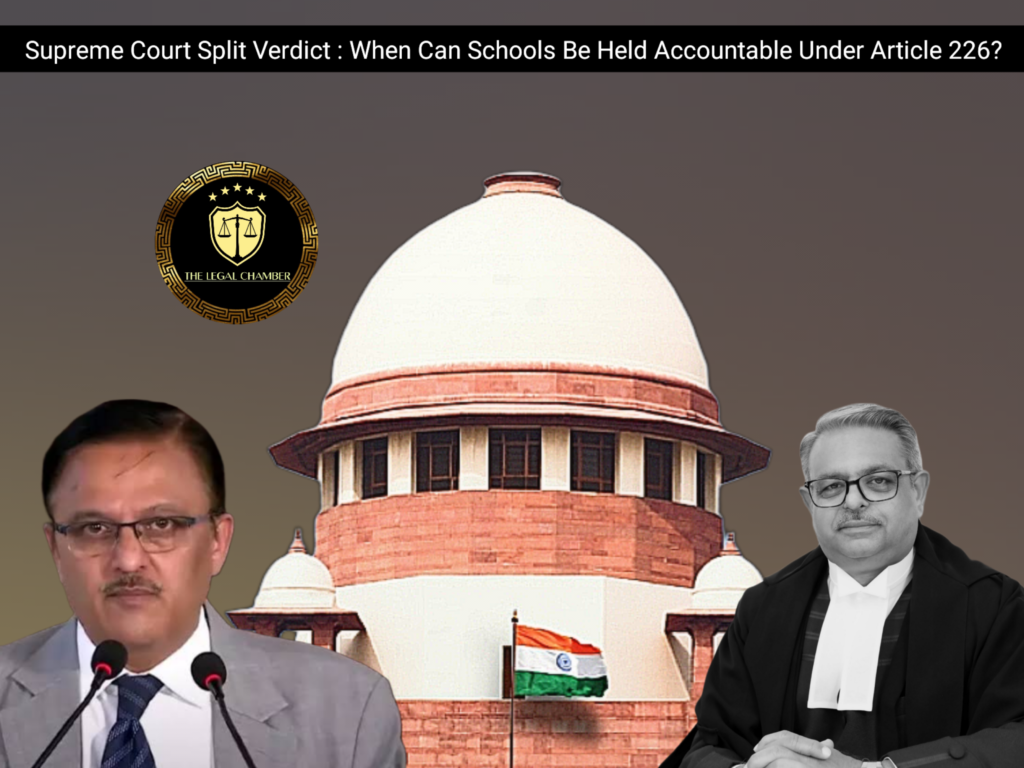
The Supreme Court examined whether Air Force Schools qualify as a “State” under Article 12 or an “authority” amenable to writ jurisdiction under Article 226 of the Constitution. The majority held that despite partial government control and funding, the schools lacked pervasive state dominance, relegating disputes to private contract law. However, the dissenting opinion emphasized their public function, deep administrative control by the Indian Air Force, and indirect public funding, making them subject to writ jurisdiction. The split verdict clarifies the distinction between regulatory control and pervasive state authority in educational institutions
Facts Of The Case:
The case involved two civil appeals before the Supreme Court concerning the Air Force School, Bamrauli, Allahabad. In Civil Appeal No. 10899 of 2013, Dileep Kumar Pandey, a physical education teacher, was appointed in 2005 but later declared “surplus” in 2007. He challenged his termination, arguing the school was a “State” under Article 12, making his dismissal subject to judicial review. The Allahabad High Court initially ruled in his favor, but a Division Bench reversed the decision, holding the school was not a “State.” In Civil Appeal No. 11378 of 2013, Sanjay Kumar Sharma, a commerce teacher and acting principal, faced disciplinary proceedings and termination after disputes over his replacement by another teacher. His writ petitions were dismissed on the grounds that the school was not amenable to writ jurisdiction.The key issue was whether the school, managed by the Indian Air Force Educational and Cultural Society (IAFECS), qualified as a “State” under Article 12 or performed public functions under Article 226. The appellants argued that the school was financially and administratively controlled by the Indian Air Force, while the respondents claimed it operated independently using non-public funds. The Supreme Court’s split verdict addressed whether such institutions could be subjected to constitutional writ remedies.
Procedural History:
The case originated from two separate writ petitions filed before the Allahabad High Court by teachers of the Air Force School, Bamrauli. In Dileep Kumar Pandey’s case, the Single Judge initially ruled in 2010 that the school was a “State” under Article 12, making his termination amenable to judicial review. However, the Division Bench overturned this decision in 2010, holding that the school was not a “State.” Similarly, in Sanjay Kumar Sharma’s case, the High Court dismissed his petitions challenging disciplinary actions, agreeing with the Division Bench’s view.
Both matters were then appealed before the Supreme Court, where they were clubbed for a common judgment. The apex court delivered a split verdict in 2025. The majority opinion, authored by Justice Abhay S. Oka, upheld the High Court’s view that the school was not a “State” under Article 12, relegating the disputes to private contract law. The dissenting opinion by Justice Ahsanuddin Amanullah, however, emphasized the school’s public function and pervasive control by the Indian Air Force, making it subject to writ jurisdiction under Article 226. The case thus settled key questions on the applicability of constitutional remedies to military-run educational institutions.
READ ALSO: Supreme Court Orders Digital Portal & Patrol Teams to Curb Illegal Occupations on National Highways
Court Observation:
The Supreme Court delivered a split verdict with contrasting observations on whether Air Force Schools qualify as “State” under Article 12 or fall under writ jurisdiction under Article 226.The majority opinion (per Justice Oka) held that while the Indian Air Force exercised some administrative control over the school, it lacked pervasive financial and functional dominance by the government to be considered a “State.” The court noted that the school primarily operated through non-public funds, its governing Education Code lacked statutory force, and employment disputes remained in the realm of private contract law. The mere use of Air Force infrastructure and partial oversight did not establish the deep control required under Article 12.The dissenting opinion (per Justice Amanullah) emphasized that the school performed a public function (imparting education) under the overarching control of the Indian Air Force, with funding traceable to regimental and welfare funds—effectively public money. The dissent highlighted that the composition of the managing committee (dominated by IAF officers) and the school’s affiliation with CBSE demonstrated sufficient state nexus, making it amenable to writ jurisdiction under Article 226, even if not a “State” under Article 12.The judgment thus left unresolved whether military-run schools are wholly excluded from constitutional remedies, balancing regulatory oversight against institutional autonomy.
Final Decision & Judgement:
The Supreme Court, in a 2:1 majority decision, dismissed both appeals and upheld the Allahabad High Court’s ruling that Air Force School, Bamrauli is not a “State” under Article 12 of the Constitution. The majority (Justices Oka and Masih) held that the school’s management by the Indian Air Force Educational & Cultural Society (IAFECS) did not demonstrate the deep and pervasive control required to bring it under Article 12, as its funding primarily came from non-public sources like tuition fees and regimental funds. The Court emphasized that the Education Code governing the school lacked statutory backing, making employment disputes purely contractual in nature.However, in a strong dissent, Justice Amanullah argued that the school performed an essential public function (imparting education) under the dominant control of IAF officers, using infrastructure and funds traceable to government sources. He concluded that while it may not strictly qualify as a “State,” it was sufficiently public in character to be amenable to writ jurisdiction under Article 226.The final judgment thus denied relief to the teachers but left open the broader question of whether military-run schools could face constitutional scrutiny in exceptional cases involving public duty violations.
Case Details:
Case Title:Dileep Kumar Pandey vs. Union of India & Ors. Citation:2025 INSC 749 Appeal No.:Civil Appeal No. 10899 of 2013 Date of Judgment:May 21, 2025 Bench Composition:Justice Abhay S. Oka & Justice Augustine George Masih
Download The Judgement Here